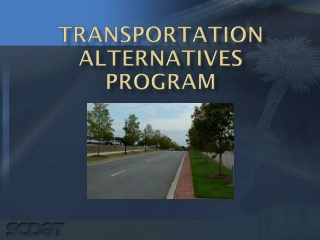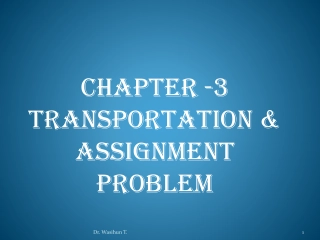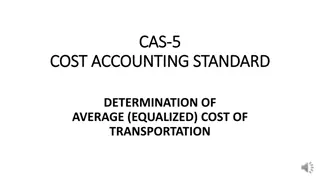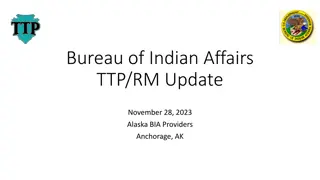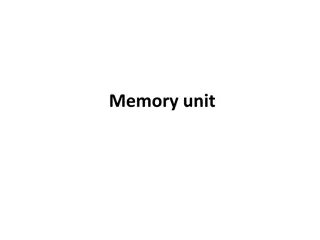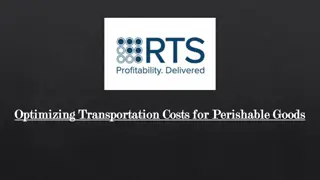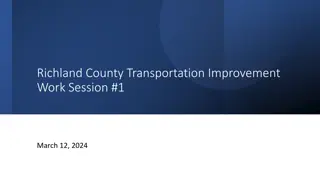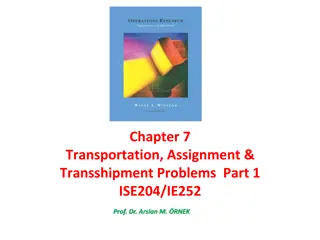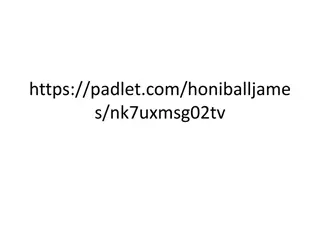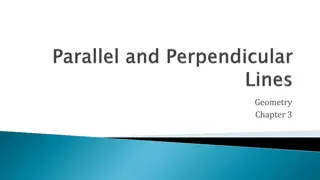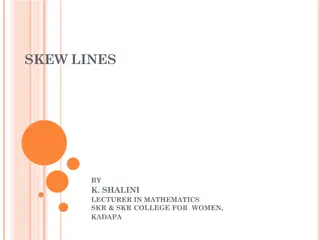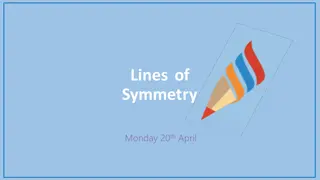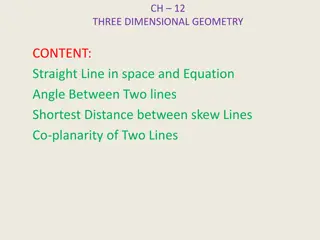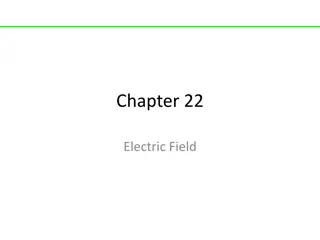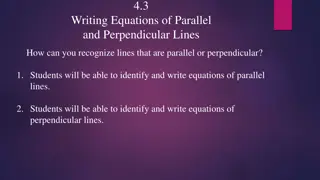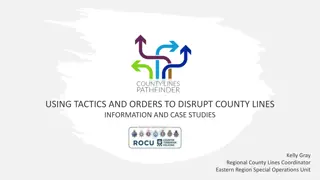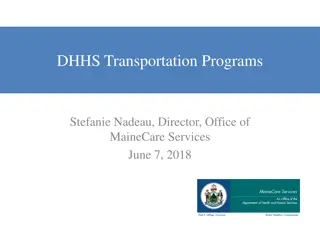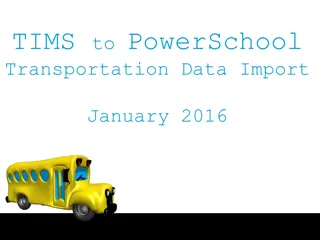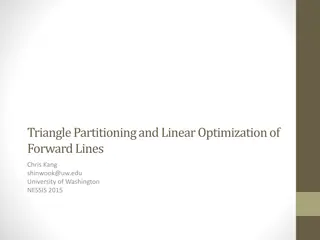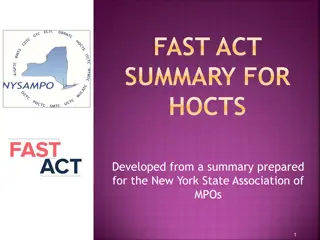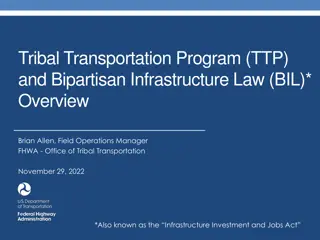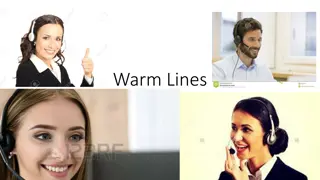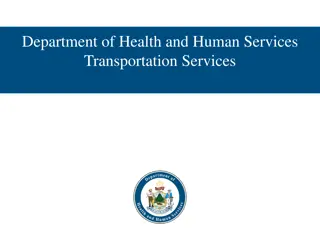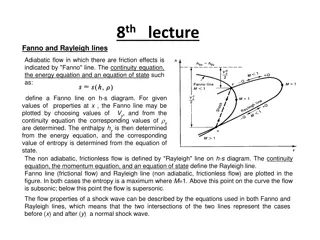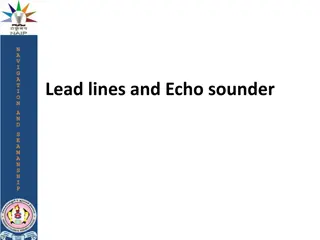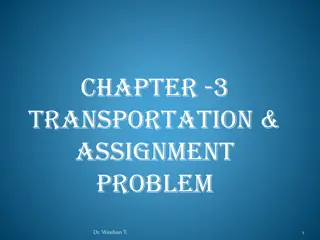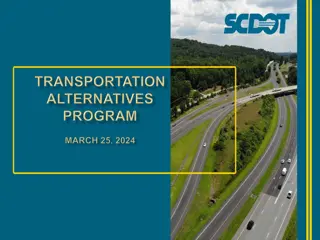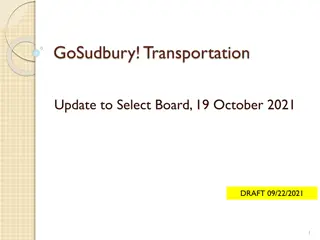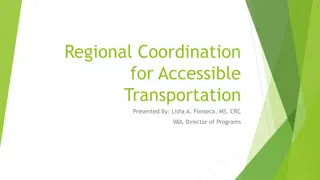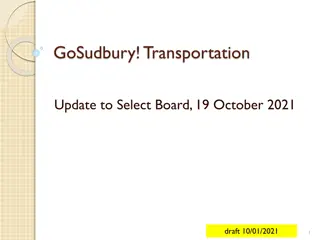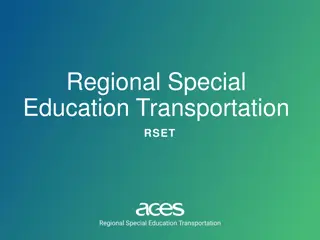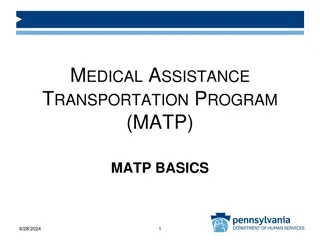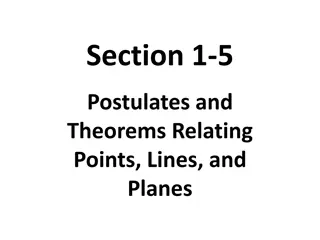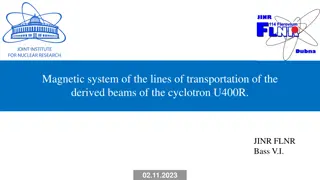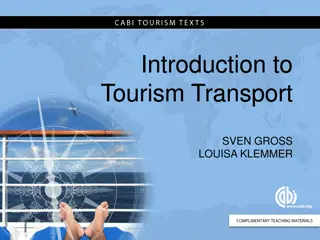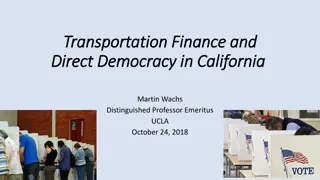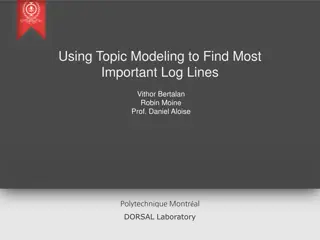Funding Opportunities for Non-Motorized Transportation in South Carolina
The US Department of Transportation's Federal Highway Administration provides funding to South Carolina through the Transportation Alternatives Program (TAP) to support non-motorized transportation initiatives. Local governments, schools, and other entities can partner with the South Carolina Depart
1 views • 21 slides
Transportation & Assignment Problem Overview
The transportation problem involves optimizing shipment costs from multiple sources to multiple destinations with known supply and demand constraints. This chapter discusses the characteristics of transportation problems, key assumptions, and how to formulate the transportation model. Dr. Wasihun T.
0 views • 64 slides
Enhancing Transportation Performance Management through TSMO Collaboration
Advancements in technology and evolving customer needs are driving changes in transportation management. Transportation Systems Management and Operations (TSMO) offers strategies to optimize operational performance, complementing traditional capacity projects. Collaboration between TSMO and Transpor
1 views • 77 slides
Cost Accounting Standards for Determining Transportation Costs
Understanding the importance of transportation costs in procurement and distribution, this guide outlines the standards for determining average costs, separation of transportation costs in accounting records, objectives for maintaining cost uniformity, components of transportation costs, and treatme
0 views • 11 slides
Update on BIA Transportation Programs in Alaska
The update covers the Bureau of Indian Affairs (BIA) Transportation Programs in Alaska, including funding details for the Tribal Transportation Program (TTP) and BIA Road Maintenance Program. It discusses the current funding status, upcoming appropriations, and maintenance activities on BIA-owned ro
0 views • 10 slides
Understanding Transportation Programs and Trends
Transportation training session led by Megan Johnson, featuring topics such as Transportation Crash Course, Training Opportunities, and Transportation Trends & Updates. Includes discussions on different types of transportation services and their importance for communities.
2 views • 38 slides
Understanding Memory Units in Computing
Memory units are essential components in computing devices that store binary information in words, allowing for fast and efficient data retrieval. They consist of storage cells, circuits, and address selection lines for communication. Random Access Memory (RAM) enables quick access to data, while Re
6 views • 15 slides
Optimizing Transportation Costs for Perishable Goods
In the realm of logistics, the transportation of perishable goods presents a unique challenge. From fresh produce to pharmaceuticals, these time-sensitive commodities require specialized handling and efficient transportation to maintain their quality and integrity. One of the critical aspects of man
2 views • 6 slides
Richland County Transportation Improvement Summary
Richland County's transportation improvement work includes sessions on project principles, funding options, project costs, and guidelines for utilizing the transportation penny. The focus is on addressing transportation needs, project prioritization, funding challenges, and division of funds for var
0 views • 19 slides
Transportation Problem Modeling in Supply Chain Management
This content discusses the formulation and solution of transportation problems in the context of supply chain management, using a specific example of wheat transportation between grain elevators and mills. It covers the characteristics of transportation problems, linear programming model formulation
3 views • 55 slides
Transportation Planning and Data Collection Insights
Understanding transportation planning involves various stages such as data collection, study area definition, and selection of external cordon lines. Collecting data on existing travel patterns, transport facilities, and land use is crucial for formulating effective transportation plans. Defining th
0 views • 27 slides
Comprehensive Overview of Geometry Chapter 3 Concepts
Dive into the fundamentals of lines, planes, parallelism, and angles in Geometry Chapter 3. Explore topics such as identifying lines and planes, understanding parallel and perpendicular lines, and recognizing angle relationships formed by transversals. Discover the properties of parallel lines, tran
0 views • 42 slides
Understanding Skew Lines and Planes in 3D Geometry
Explore the concepts of skew lines, parallel lines, perpendicular lines, and planes in 3D geometry through real-life examples and equations. Learn about the shortest distance between skew lines and solve problems related to their applications.
1 views • 46 slides
Geometry Learning - Lines of Symmetry Activities
Explore various activities focused on lines of symmetry in shapes. Engage in identifying symmetrical shapes, finding lines of symmetry through folding, sorting shapes based on symmetrical properties, drawing lines of symmetry, and reasoning about symmetrical shapes. Enhance your understanding of sym
0 views • 16 slides
Three-Dimensional Geometry: Direction Cosines and Angles
Understanding direction cosines and angles in three-dimensional geometry is crucial for determining the orientation of lines in space. By calculating direction cosines, we can find the angles a line makes with the positive directions of the X, Y, and Z axes. This knowledge helps in various geometric
0 views • 18 slides
Understanding Electric Field Lines and Charges
Electric field lines provide a visual representation of the electric field around charges. They show the direction of the electric field and help understand the intensity of the field at different points. Field lines never cross each other and the tangent at any point on a line gives the field direc
0 views • 40 slides
Understanding Parallel and Perpendicular Lines
Students will learn to identify and write equations of parallel and perpendicular lines by understanding the relationship between slopes. Parallel lines have the same slope, while perpendicular lines intersect to form right angles. Through examples and explanations, students will gain the skills to
0 views • 12 slides
Using Tactics and Orders to Disrupt County Lines: Case Studies and Strategies
Exploring the approach of using tactics and orders to disrupt county lines, this content outlines the Drug Dealing Telecommunications Restriction Order (DDTRO) process and its impact on drug supply chains. Case studies like the successful DDTRO conducted by the North West Regional Organised Crime Un
0 views • 21 slides
Maine DHHS Transportation Programs Overview
The Maine Department of Health and Human Services (DHHS) oversees various transportation programs aimed at providing non-emergency transportation services to low-income, child welfare-eligible, and Section 17-eligible individuals. These programs are managed through regional brokerage systems, with b
3 views • 5 slides
Importing TIMS Transportation Data into PowerSchool
Explore the process of extracting, formatting, purging, and importing TIMS transportation data into PowerSchool for efficient management of student transportation information. This includes creating TIMS extracts, updating bus stop information, and optimizing transportation planning through geocodin
2 views • 43 slides
Triangle Partitioning and Linear Optimization in Hockey Line Analysis
In this presentation, the speaker discusses the use of triangle partitioning and linear optimization techniques to analyze hockey team lines. The goal is to find chemistry between players, allocate ice time effectively, and match up against opposing lines for a better chance of winning games. Tradit
0 views • 16 slides
Overview of FAST Act for Transportation Planning
The FAST Act, passed in 2015, authorizes federal programs for transportation development with a focus on surface transportation. It extends funding through 2020, totaling $304.7 billion. The Act aims to enhance resiliency, reliability, and stormwater mitigation in transportation systems. Planning fa
2 views • 10 slides
Tribal Transportation Program & Bipartisan Infrastructure Law Overview
The Tribal Transportation Program (TTP) and Bipartisan Infrastructure Law (BIL) provide funding for essential transportation projects in Tribal communities. The TTP Bridge Fund, Safety Fund, and High Priority Projects aim to improve infrastructure and safety. The BIL funding for FY22-FY26 totals $3.
1 views • 13 slides
Understanding Warm Lines: A Vital Support System Beyond Crisis Intervention
In the realm of mental health support, warm lines serve as invaluable resources beyond crisis intervention hotlines. Originating in the late 1950s, these lines cater to individuals facing non-crisis challenges such as depression, loneliness, and relationship issues. Project Return Peer Support Netwo
0 views • 27 slides
DHHS Coordination of Transportation Service Contracts Overview
The Department of Health and Human Services in Maine conducted an assessment of Transportation Services in June 2019. The workgroup identified three main priorities: alignment of Quality and Performance Measures, Safety Measures, and Evaluation of Transportation Services. The first priority involves
0 views • 28 slides
Understanding Fanno and Rayleigh Lines in Adiabatic Flow
Fanno and Rayleigh lines on the h-s diagram help in analyzing adiabatic flow with friction effects. The Fanno line represents frictional flow, while the Rayleigh line signifies non-adiabatic, frictionless flow. These lines aid in plotting flow properties and understanding phenomena like shock waves
0 views • 6 slides
Understanding Lead Lines and Echo Sounders for Depth Measurement
Dive into the world of lead lines and echo sounders for depth measurement. Discover the ancient navigational instrument, the construction of lead lines, and the markings used for different depths. Learn about the traditional use of lead lines by fishermen and the importance of these tools in shallow
0 views • 23 slides
Understanding Transportation and Assignment Problem
Transportation and assignment problems involve optimizing the shipment of goods from various sources to multiple destinations while minimizing total transportation costs. These problems deal with limited supply, known demand, constant shipping costs, and integer quantities. The transportation algori
0 views • 64 slides
Enhancing Transportation Infrastructure Through Federal Funding Programs
The Transportation Alternatives Program (TAP) funded by the USDOT's Federal Highway Administration supports transportation projects in South Carolina based on population categories. TAP funds are allocated to Transportation Management Areas (TMAs), Small Urban Areas, and Non-Urban Areas, prioritizin
0 views • 21 slides
Addressing Transportation Gaps in Sudbury: A Livable Community Approach
The Sudbury Transportation Committee, established by the Select Board, aims to enhance transportation in Sudbury to create a livable community. Focusing on inclusivity, equity, and addressing transportation gaps impacting various aspects of livability, the initiative seeks to improve social particip
0 views • 16 slides
Understanding Regional Coordination for Accessible Transportation
This presentation delves into the concept of regional coordination in accessible transportation, focusing on the Regional Transportation Advisory Panel, 5-year regional transportation goals, and the significance of the Safe, Accountable, Flexible, Efficient Transportation Equity Act. It emphasizes t
0 views • 16 slides
Enhancing Livability in Sudbury Through Transportation Initiatives
The GoSudbury! Transportation Update to the Select Board on October 19, 2021 highlights the importance of addressing transportation as a key component of livable communities. The initiative aims to create a safe, secure, and inclusive environment by improving transportation options for residents of
0 views • 26 slides
Regional Special Education Transportation (RSET) Program Overview
RSET, which stands for Regional Special Education Transportation, is an initiative developed by ACES to help districts save money while safely transporting students to out-of-district placement sites. The program benefits districts by reducing transportation costs, addressing parent concerns, and ma
0 views • 13 slides
Understanding Pennsylvania's Medical Assistance Transportation Program (MATP)
The Medical Assistance Transportation Program (MATP) in Pennsylvania provides essential transportation services to access medical care. Governed by state plans and codes, MATP aims to offer access to medical, pharmacy services, chronic disease management, and preventative care. Transportation provid
0 views • 16 slides
Geometric Postulates and Theorems Relating Points, Lines, and Planes
This section introduces the postulates and theorems related to points, lines, and planes in geometry. It covers basic assumptions, postulates about lines and planes, and theorems about intersections. The concept of "exactly one" and "one and only one" is emphasized, highlighting the unique relations
0 views • 10 slides
Understanding Basic Geometrical Ideas in Geometry
Basic Geometrical Ideas in Geometry cover the fundamental concepts of points, lines, and planes. Points are described as having location but no size, lines are infinite sets of points, and collinearity is discussed. The importance of straightness in lines is assumed but not defined. Symbols and nota
0 views • 45 slides
Reconstruction of U400 Cyclotron Transportation Lines at JINR FLNR
The Flerov Laboratory of Nuclear Reactions at the Joint Institute for Nuclear Research is reconfiguring the U400 cyclotron to enhance transportation of charged particle beams. The project involves creating new channels to the SHELS installation and New Experimental Hall. Detailed calculations of tur
0 views • 9 slides
Exploring Marine Transportation in Tourism
Marine transportation plays a crucial role in the tourism industry, offering various options like passenger ships, recreational boats, charter boats, houseboats, cruise ships, and passenger lines/ferries. Each type serves different functions to cater to the diverse needs of tourists seeking leisure
0 views • 4 slides
Transportation Finance and Direct Democracy in California
Proposition 6 on November 6th has garnered attention, but voters in multiple states will decide on over 250 transportation ballot measures totaling over $55 billion. California, with a longer history and greater funding needs, has been at the forefront of transportation investments, including the us
0 views • 29 slides
Utilizing Topic Modeling for Identifying Critical Log Lines in Research
By employing Topic Modeling, Vithor Bertalan, Robin Moine, and Prof. Daniel Aloise from Polytechnique Montréal's DORSAL Laboratory aim to extract essential log lines from a log parsing research. The process involves building a log parser, identifying important log lines and symptoms, and establishi
0 views • 18 slides
